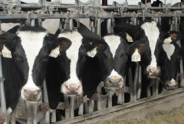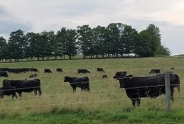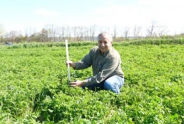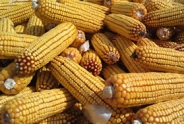David Balbian's Retirement Statement
David Balbian, Area Dairy Specialist
Central New York Dairy and Field Crops
I have decided that it's time to retire. I find myself at a point in time where I'm now beginning to work with the 3rd generation of people on the farms in our region. It's time to bring in some new young blood into the team. June 28th will be my last official day on the job. I've enjoyed working with you all. The real satisfaction I've had with my work has been seeing producers take my advice and then be successful with it as they moved their business and family forward.
Many things are rapidly changing in the dairy industry. Research continues to unlock more and more things that have limited productivity and profitability on our dairy farms. Improved management strategies and the use of electronic and computer technologies have improved the health of our animals. A few things that local producers have said to me really sums up the kind of decision making that helps a dairy to be successful into the future. An intelligent and successful old timer who did not get a formal education past high school said a couple of things to me that I will never forget. He said, "I try to sell more milk every year. I feel that if I don't I'll be falling behind." He was implying that the rest of the industry was moving forward and if he did not continue to move forward he and his business would be falling behind and he would lose his competitive advantage. He also said to me (after making some bad decisions that caused him some financial losses) "I guess that's my tuition." When I asked him what he meant by that he said, "Well, I never went to college to learn about all the latest things in dairy production, so when I screw up and it costs me money I think of that mistake as tuition." Another younger dairy producer who took over his dairy from a very successful senior generation after being an employee for many years said his former boss told him (as he was taking over the ownership and management of the farm) that "you don't necessarily want to be the first one to try a new management strategy or new technology, BUT if it's obvious that it is profitable you'll want to be one of the early adopters of that practice. You can't afford to not adopt it if you want to be successful in this business."
I remember when if you had a 20,000 lb. rolling herd average you had the top herd in the county. Today, that is below average. Rolling herd averages above 30,000 lbs. are not uncommon today. The world record cow produced 78,170 lbs. with a 4.0% far and 3.1% protein. The owners say that her pedigree is not all that sexy. They have done some genomic testing, but have not used it to cull animals. In fact, when questioned about some people using genomics to decide which animals to raise as replacements, they said that this cow would have not made the cut. She would have been culled as a calf. That really tells me that the genetics on most dairy herds today is not a limiting factor in productivity. Genetics is still important. However, productivity and profitability is more influenced by management and nutrition.
So, I think there is a bright future in dairy research and the need to get that information into the hands of dairy producers who strive to be a part of the industry long into the future. There are some very bright young minds out there in the industry. I'm sure the Central New York team will find someone to fill the role of Dairy Management Specialist. I wish them and the team the very best and every success in the future.
Thank You All for Your Support over the Years, Dave
P.S. I'll still be around for a few more months.
Upcoming Events
Swine Production Zoom Series
February 5, 2026
February 19, 2026
March 5, 2026
March 19, 2026
April 2, 2026
Register for the whole series or for one or several sessions.
Announcements
Statewide Field Crop Pathology Needs Assessment Survey
Your input is wanted for identifying priorities!Sign Up for Our Weekly E-Newsletter
We send out a bi-weekly e-newsletter that has announcements, upcoming programs, and opportunities for you! Registration is quick, easy, and free. Click here to sign up today!Farmers Can Join MeatSuite For Free!
MeatSuite.com is a free resource provided by Cornell University where NY meat farmers can create a farm profile and list their bulk (wholes, halves, quarters) and bundled (i.e. Grilling Bundle) meat products.Why should farmers join?
1. It's free and easy!
2. Connect with more local customers. In the past year the MeatSuite.com farm directory had 8,300 visits from New York consumers. Farm profiles get as many as 25 views per month from potential local customers. We also spotlight MeatSuite farms on social media and bring attention and purchases to farms through highlights and giveaways.
How do I join?
Farmers can visit https://www.meatsuite.com/farmers/ to create a free farm profile. You must list at least one product for your farm's profile to go live. You'll also have access to Cornell's free Meat Price Calculator, a helpful tool for pricing your meat to make a profit.
While you're on MeatSuite, check out the "Creating Consumer-Friendly Bulk Meats" publication on the log-in page. It has tips on how to create bulk meat products that are easier for first-time buyers to say "yes" to.
If you have any questions as you create your farm profile or products, we're here to help! Please email Matt LeRoux at mnl28@cornell.edu.




